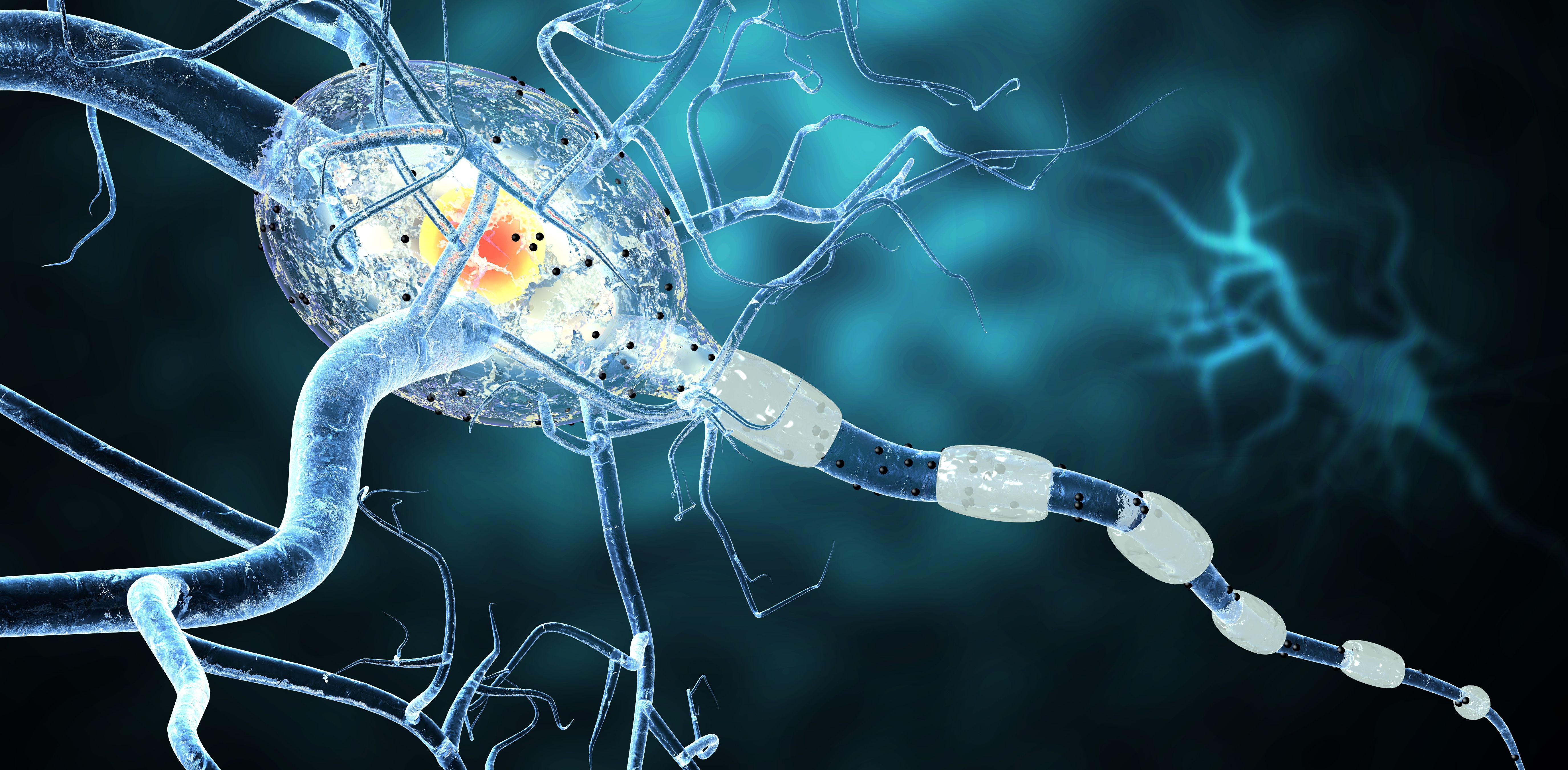- Center on Health Equity & Access
- Clinical
- Health Care Cost
- Health Care Delivery
- Insurance
- Policy
- Technology
- Value-Based Care
BTK Inhibitor Evobrutinib Fails to Meet Primary End Points in Phase 3 EVOLUTION Trials
Results showed that evobrutinib did not produce a more superior reduction in annualized relapse rates than teriflunomide, a previously approved disease-modifying agent.
This article was originally published in NeurologyLive® and has been lightly edited.
According to an announcement, evobrutinib (Merck KGaA/EMD Serono), an investigational Bruton’s tyrosine kinase (BTK) inhibitor in development for patients with multiple sclerosis (MS), did not meet its primary end points of reducing relapse in the phase 3 EVOLUTION trials. The company plans to evaluate the totality of the data for a planned future presentation and publication of the results.1
Multiple Sclerosis Model | image credit: ralwel - stock.adobe.com

All told, in both the evolutionRMS 1 (NCT04338022) and evolutionRMS 2 (NCT04338061) studies, evobrutinib failed to distinguish itself from oral teriflunomide (Aubagio; Sanofi) in reduction of annualized relapse rate (ARR; evolutionRMS 1: 0.11 vs 0.11; evolutionRMS 2: 0.15 vs 0.14; P = NS in both trials). Notably, ARR values in the teriflunomide group were reportedly lower than previously seen in other phase 3 studies. Merck also noted that the safety and tolerability profile of evobrutinib was consistent with previous studies.
"With evobrutinib, our aim was to address the significant unmet need of smoldering MS in addition to strong relapse control for people living with this condition," Danny Bar-Zohar, global head of Research & Development and chief medical officer for the Healthcare business sector of Merck KGaA Darmstadt, Germany, said in a statement.1 "While we are very disappointed with the results, we continue to advance our strategy in healthcare with a focus on progressing our marketed portfolio and internal pipeline, complemented by external innovation, with the aim of bringing more medicines to patients, faster. I would like to sincerely thank all patients participating in the trials, their caregivers and our network of dedicated clinical investigators."
In the EVOLUTION program, patients were randomized 1:1 to either evobrutinib 45 mg twice-daily and oral placebo once-daily or teriflunomide 14 mg once-daily and oral placebo twice-daily for up to 156 weeks with a minimum treatment duration of 24 weeks. Teriflunomide, an immunomodulator that affects the production of T and B cells, has been FDA-approved since 2012.
Earlier this year, the FDA placed a partial clinical hold on the initiation of evobrutinib in new patients with less than 70 days of exposure because of a safety concern. The decision stemmed from an assessment of 2 reported cases of laboratory values suggestive of drug-induced livery injury identified in evolutionRMS 1 and 2. Both patients were asymptomatic, did not need any medical intervention nor hospitalization for the condition, and liver enzymes fully normalized after discontinuing the drug. Despite these cases, the clinical hold had no impact on the newly reported data.2
Evobrutinib’s effect was demonstrated in a phase 2 study (NCT02975349) and its open-label extension (OLE), which were presented at the 2022 Consortium of Multiple Sclerosis Centers (CMSC) Annual Meeting. Following a double-blind 48-week treatment period, the agent showed an acceptable tolerability, as well as maintained efficacy over a 2.5-year period in patients with relapsing MS. All, told, the annualized relapse rate at the end of the OLE was 0.12 (95% CI, 0.07-0.20) for patients who received evobrutinib 75 mg twice daily.3
Later that year, at the 2022 European Committee for Treatment and Research in Multiple Sclerosis Congress, data from the trial and its OLE highlighted evobrutinib’s impact on neurofilament light (NfL), a marker of neuroaxonal damage. All told, evobrutinib decreased NfL levels in a dose-dependent manner during the 12-week double-blind period, and these reduced levels were maintained up to week 144. For those who switched from placebo to evobrutinib 75 mg BID in the open-label extension, NfL levels overall and within the original double-blind treatment groups were reduced to similar levels. In comparison with placebo treatment with evobrutinib 75 mg BID resulted in reduced NfL z-scores in a dose-dependent manner as early as week 12, and were significantly sustained for up to week 48.4
References
1. Merck KGaA, Darmstadt, Germany provides update on phase 3 results for evobrutinib in relapsing multiple sclerosis. News release. December 5, 2023. Accessed December 6, 2023. https://www.emdgroup.com/en/news/evobrutinib-phase-lll.html
2. Initiation of new patients on evobrutinib paused in the US; fully enrolled phase 3 evobrutinib studies continue. News release. April 12, 2023. Accessed December 6, 2023. https://www.emdgroup.com/en/news/evobrutinib-12-04-2023.html
3. Kuhle J, Kappos L, Montalban X, et al.Evobrutinib significantly reduces relapses and MRI outcomes in patients with multiple sclerosis: association with baseline neurofilament light chain levels. Presented at: CMSC Annual Meeting, 2022; June 1-4; National Harbor, Maryland. Abstract DMT18
4. Kuhle J, Kappos L, Montalban X, et al. Evobrutinib, a Bruton’s tyrosine kinase inhibitor, decreases neurofilament light chain levels over 2.5 years of treatment in patients with relapsing multiple sclerosis. Presented at: ECTRIMS Congress 2022; October 26-28; Amsterdam, Netherlands. Abstract EP1021
